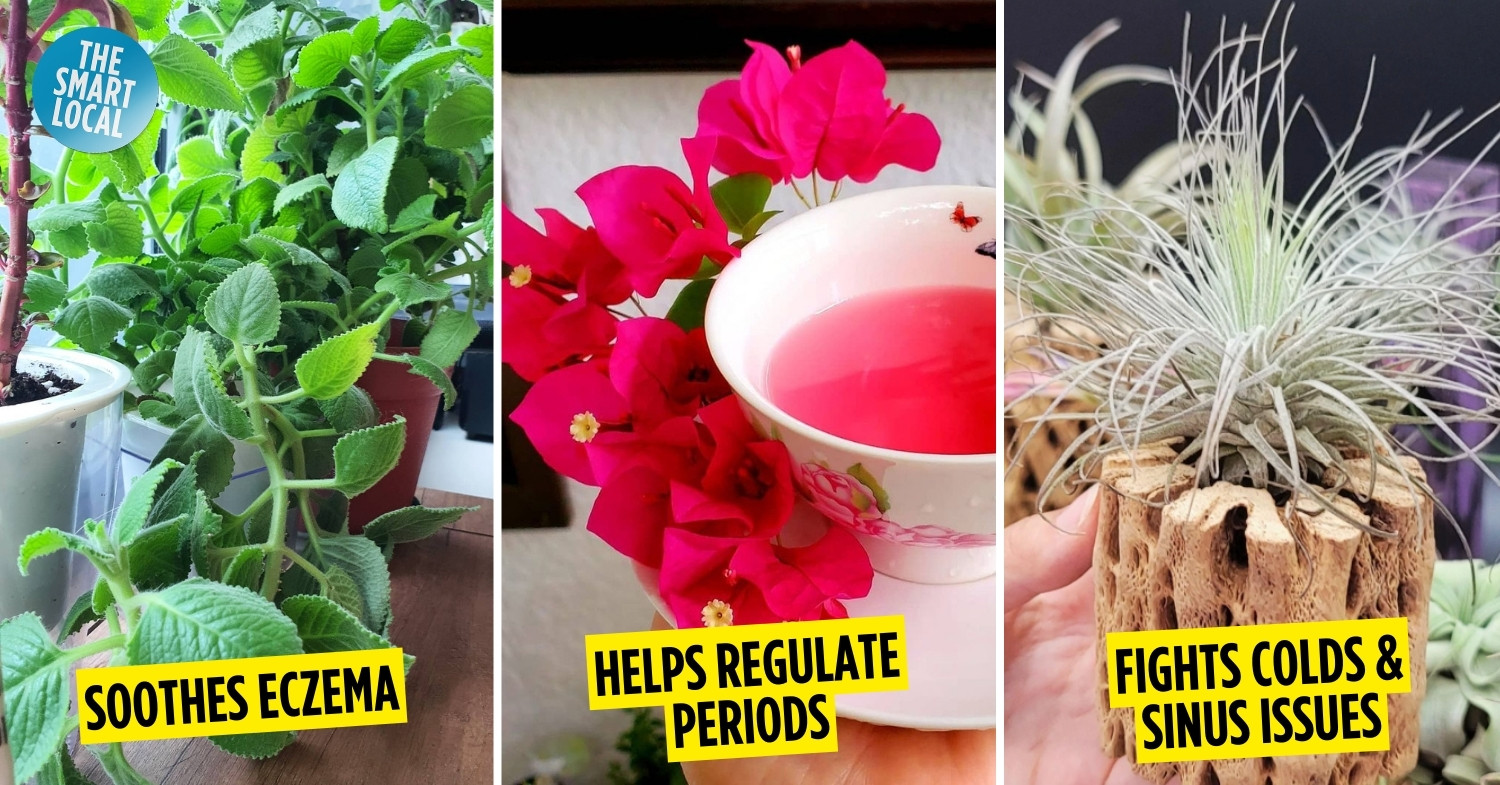Plants with benefits you can grow in Singapore
Home gardening is a wholesome pastime which gives you great returns. As you put in effort to care for your plant babies, they take care of you right back. Scoff not, because these plants with benefits actually possess au naturel health and wellness capabilities.
We’re talking plants that go beyond the general benefits of boosting air quality and beautifying your living spaces with lush greenery and colourful blooms. From natural skincare straight from the source to home remedies for ailments like sore throat, stomach aches, and even irregular menstrual cycles, here are some plants with benefits you can grow easily in Singapore.
Table of Contents
1. Aloe vera
Naturally soothes skin from itching & burns
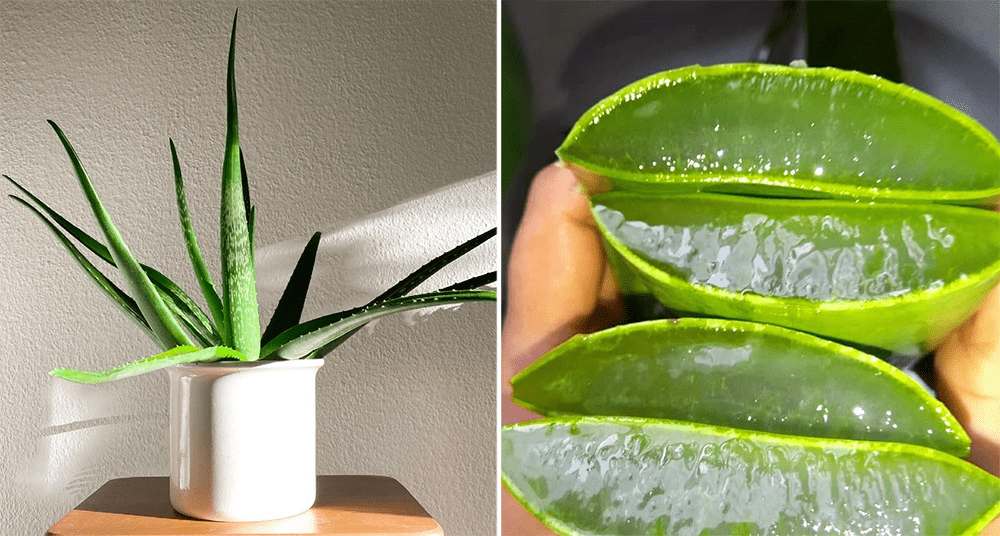
Image adapted from: @chiarasplantbabys & @mualicevi_aloevera_satisi via Instagram
Aloe vera is the go-to natural skin saviour, evident from the popularity of aloe vera gels. If you want to reap its soothing benefits straight from the source without any artificial ingredients in the mix, slice into the thick leaves and apply the clear, gel-like inner section onto your skin directly.
It’s good for sunburns and cold sores, and provides relief from itching skin conditions like eczema and psoriasis. You can even pop the entire leaf in the fridge beforehand for a gloriously cooling sensation to beat Singapore’s insane heat.
Aloe vera plants thrive in well-drained pots with porous soil to retain just the right amount of moisture. They are prone to fungal growth though, so keep your aloe leaves dry as much as possible, and give them a quick wipe-down if wet soil splashes upwards when you’re doing your routine watering.
2. Dendrobium orchid
Packed with vitamins & minerals to boost the immune system
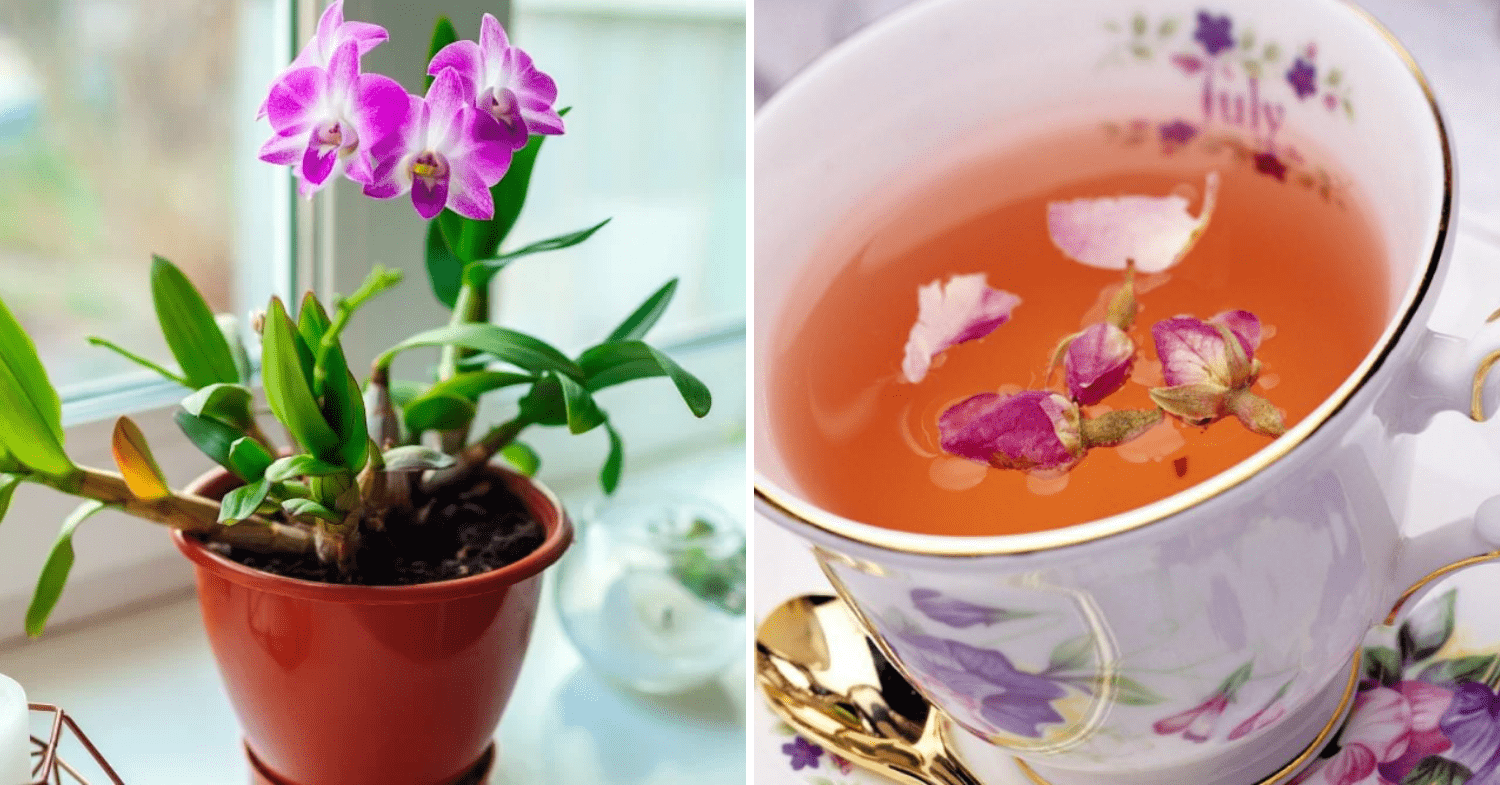
Image adapted from: Epic Gardening, Tea Etiquette Network
Owning the well-deserved title of Singapore’s national flower, orchids thrive best in areas with filtered sunlight. Avoid direct sunlight as the delicate flowers may be scorched. Dendrobium orchids in particular are prized for being edible, and highly nutrient-packed.
Sprinkle them into salads as a garnish or brew the dehydrated petals into tea. They contain high amounts of vitamin C and E, as well as calcium and magnesium. These help to boost the immune system, strengthen bones, and regulate blood sugar levels, among other benefits. Just make sure you’re not gobbling any orchid willy-nilly, as some varieties might upset the stomach.
3. Indian borage
Treats tummy trouble & soothes eczema
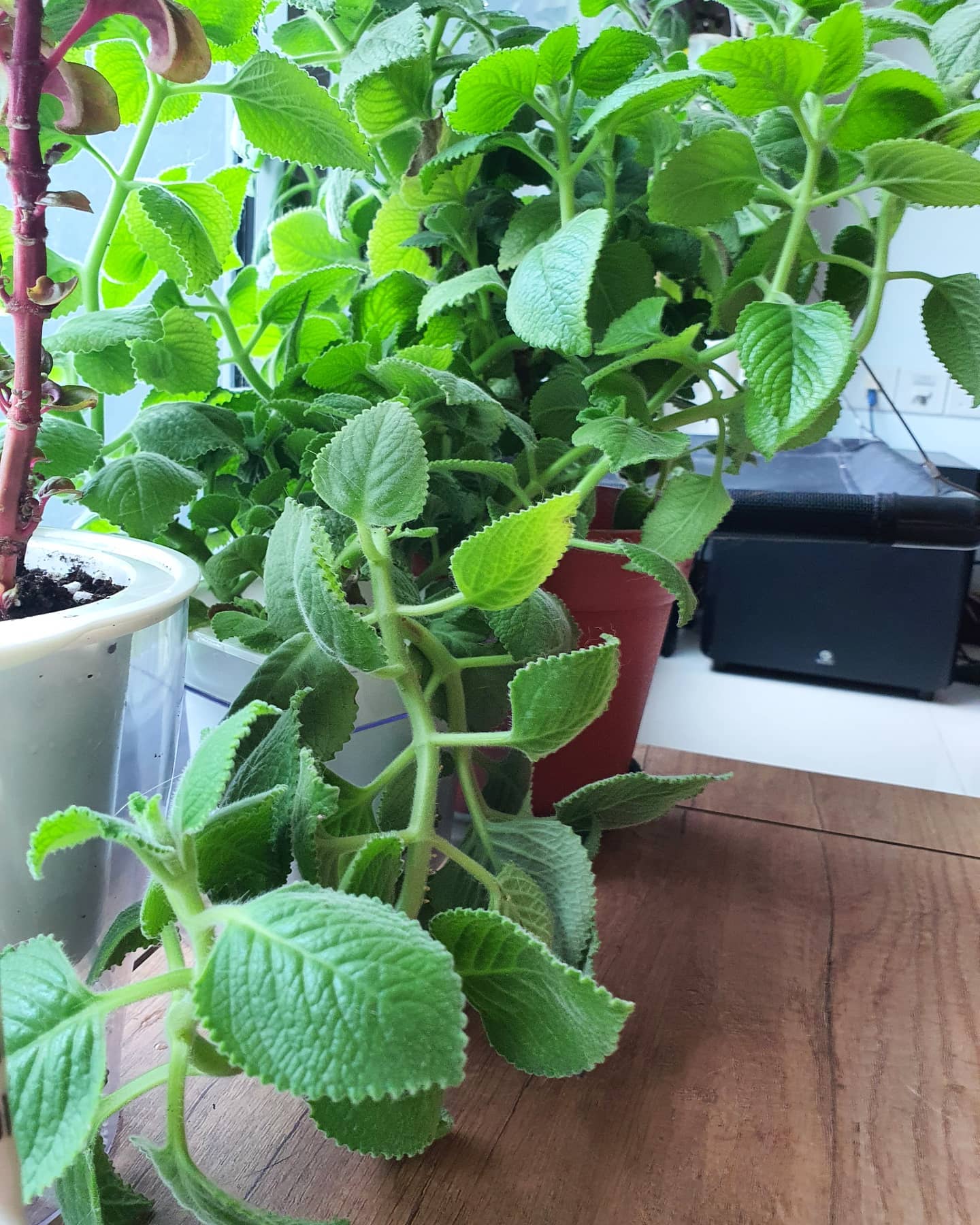
Image credit: @lifeislush via Instagram
Lesser-known to non-gardening enthusiasts, Indian borage is also referred to as Mexican mint. Its appearance is very similar to mint leaves but strangely enough, it has more of an oregano-like taste and smell. It’s a great beginner plant because it doesn’t require vast open spaces to grow, and is also known to be tough to kill.
Boiled to make tea, Indian borage is good for regulating digestion, treating heavy flatulence, and soothing stomach aches.
Research has also shown that it is potent against eczema, with Indian borage essential oils being prescribed by some dermatologists as a form of plant-based eczema relief. If you can’t get your hands on ready-made essential oils, a concentration of crushed up Indian borage leaves mixed with water will help to soothe your eczema patches too.
4. Tillandsia
Helps alleviate colds & sinus flare-ups
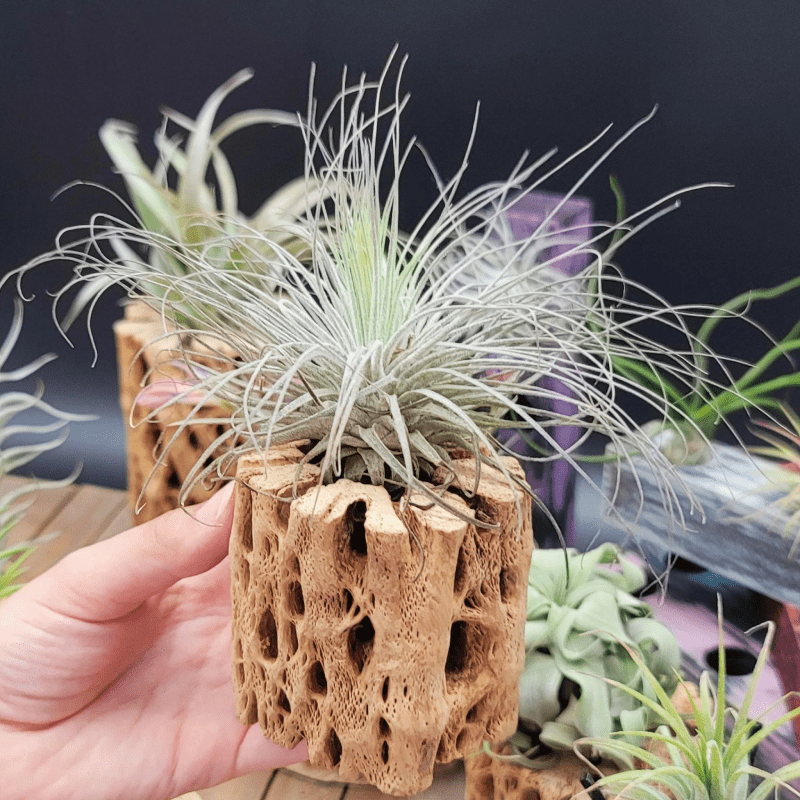
Image credit: Planet Dessert
Tillandsia is great for local home gardens because it grows well in sunlight as well as fluorescent lighting. It thrives just on air, as moisture and nutrients get absorbed from the air through its leaves, and we all know Singapore has heaps of humidity.
What you get is a low-maintenance plant baby where you won’t need to keep a strict watering schedule or fret about soil types and fertilising. In return, you’ll get to enjoy better air quality as tillandsia filters airborne contaminants in its photosynthesis process. Place it in your living spaces and it’ll help to fight conditions like colds and sinus flare-ups, since it wicks dust and irritants from the air.
5. Bougainvillea
Boosts gut, respiratory & female health
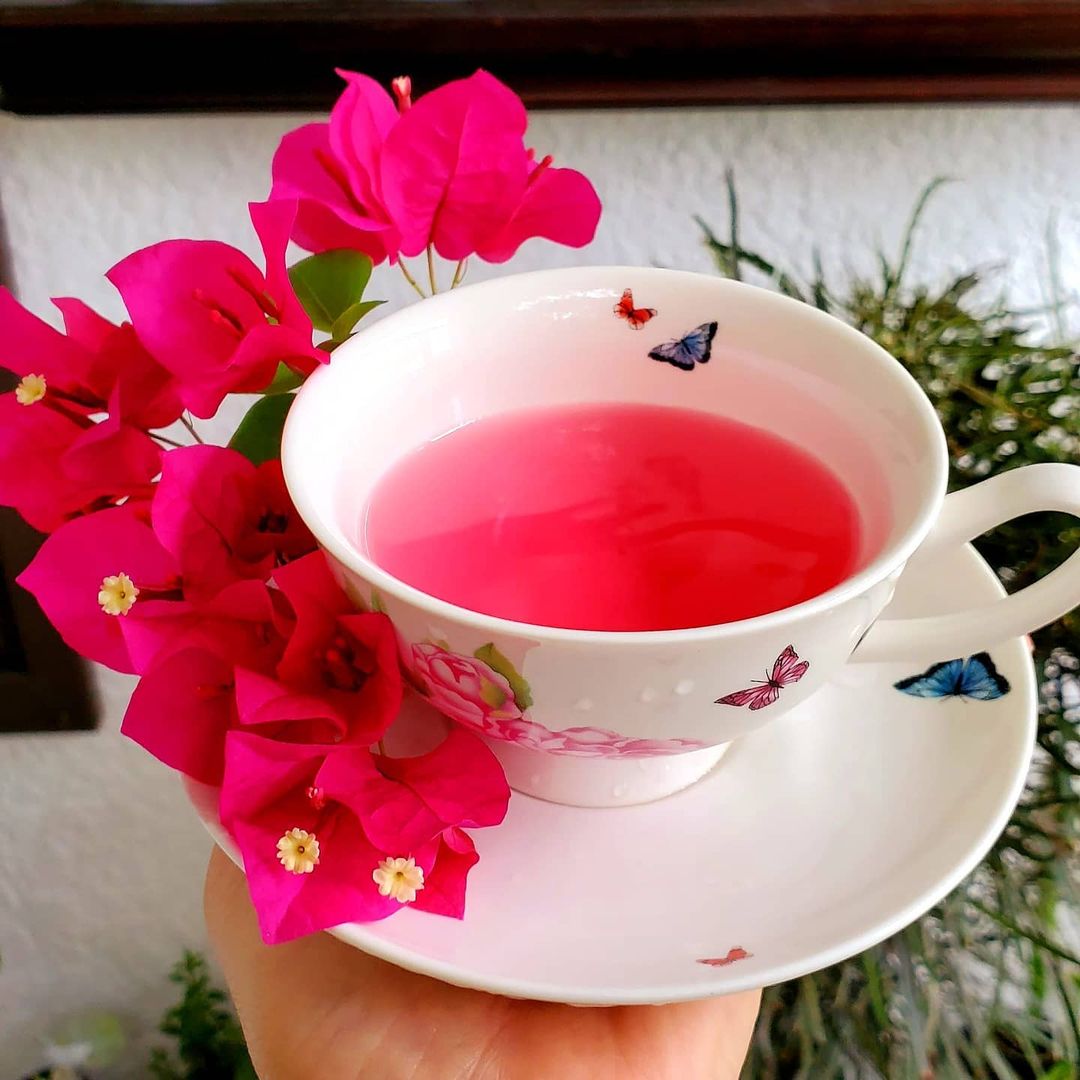
Image credit: @veggie_x_blue via Instagram
Not just a gorgeous sight in trees and bushes around Singapore, bougainvillea flowers also boast an unexpectedly wide range of health benefits. Brewed with honey, a bougainvillea tea concoction is able to help treat coughs and sore throats by promoting the expulsion of mucus from the respiratory tract.
Digestion wise, it is said to be good for combating diarrhea and tummy aches. Last but not least, listen up ladies because this pretty pink plant is supposedly able to help regulate the menstrual cycle. And because the flowers have antiseptic properties, consuming it in moderate amounts can also help promote good vaginal health.
The fab news is, bougainvilleas thrive in Singapore’s hot and humid weather conditions, so you can look forward to abundant blooms pretty much year-round.
6. Lavender
Promotes relaxation & helps to combat insomnia
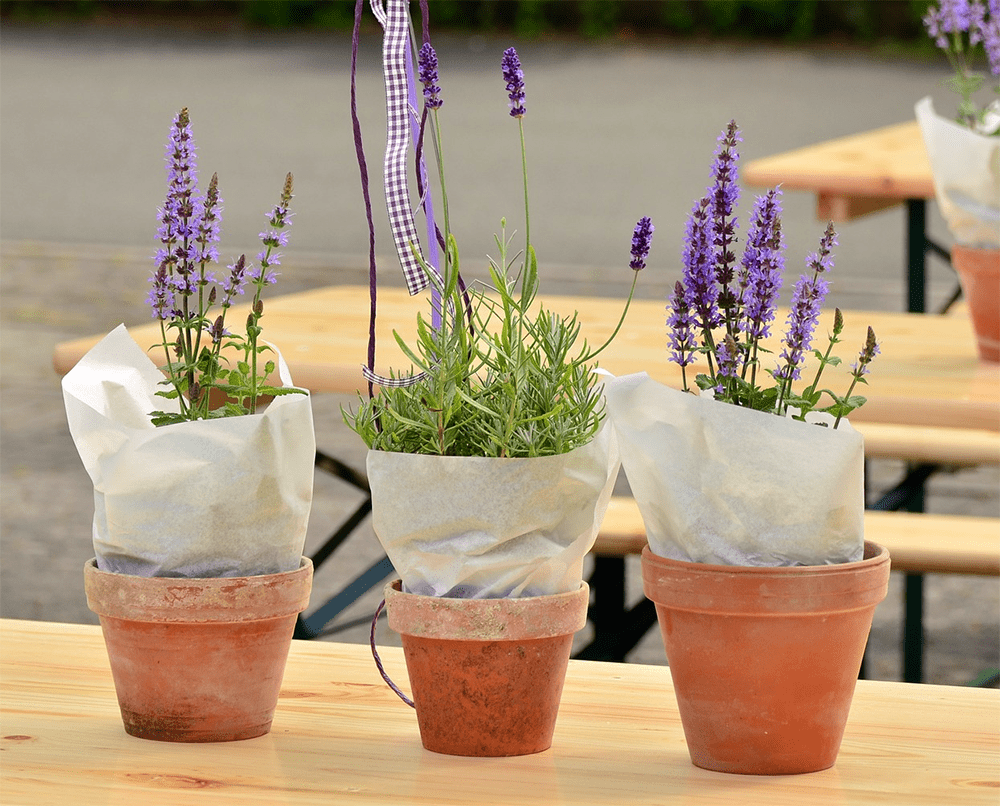
Image credit: Nurse Oasis
Those who have ever Googled “how to fall asleep” are likely to be familiar with the relaxation capabilities of lavender, used at spas and in aromatherapy products to soothe restlessness, anxiety, and treat insomnia.
Besides being able to help you nod off at night, it’s also said to be beneficial to mental health by having stress-relieving benefits. It’s worth placing a lavender plant near your work desk to keep your stress levels in check.
Lavender plants require at least 4 hours of direct sunlight daily, and grow best with deep yet infrequent watering. As a rule of thumb, only water your lavender plant when the soil feels nearly dry to the touch.
7. Jasmine
Treats ulcers, rheumatism & gut problems
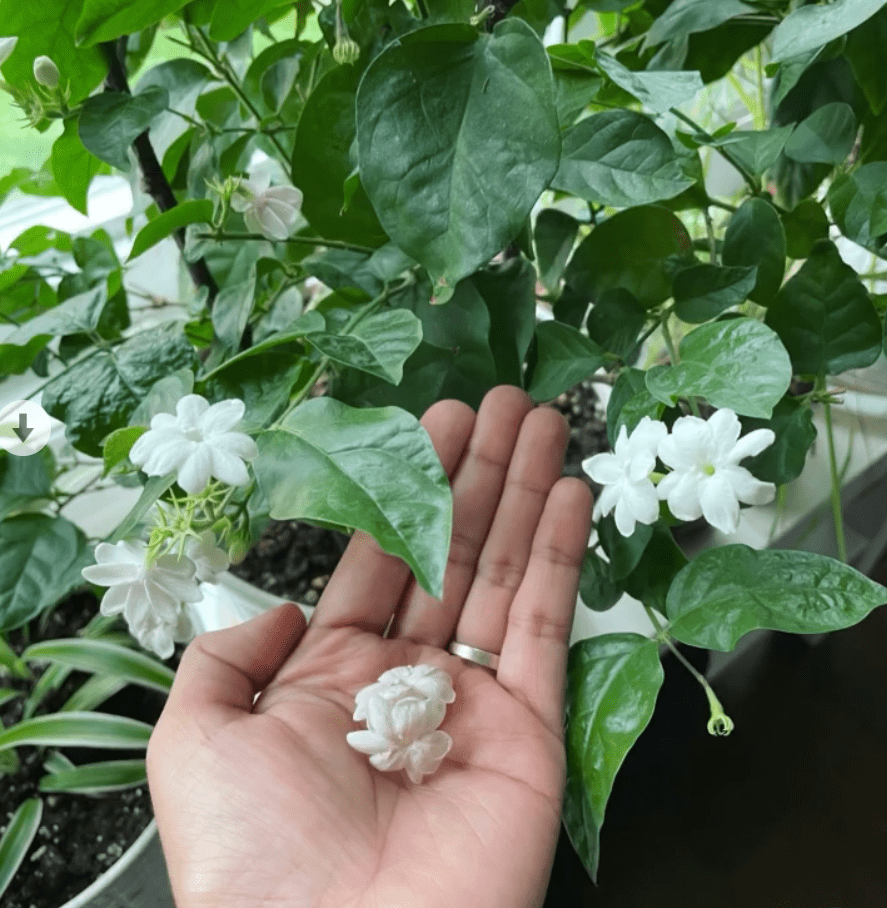
Image credit: @to_plarents via Instagram
Jasmine provides a naturally strong floral fragrance for the home, and you can rest easy knowing that it’s coming from your plant and not because a hantu is nearby – as commonly told in Singapore ghost stories. The flowers contain high amounts of antioxidants, and jasmine tea has long been linked to medicinal benefits like being able to alleviate ulcers, rheumatism, and gastrointestinal conditions.
Instead of purchasing processed jasmine tea from the supermarket, you can dehydrate your own jasmine flowers and boil them for a gut-soothing refreshment that is also beneficial for the complexion.
Seasoned home gardeners share that regular pruning of your jasmine plant after the flowers shed will result in more abundant blooms. You should also place your pot somewhere which gets at least 4-6 hours of direct sunlight each day.
8. Mint
Decongests blocked noses & provides calm
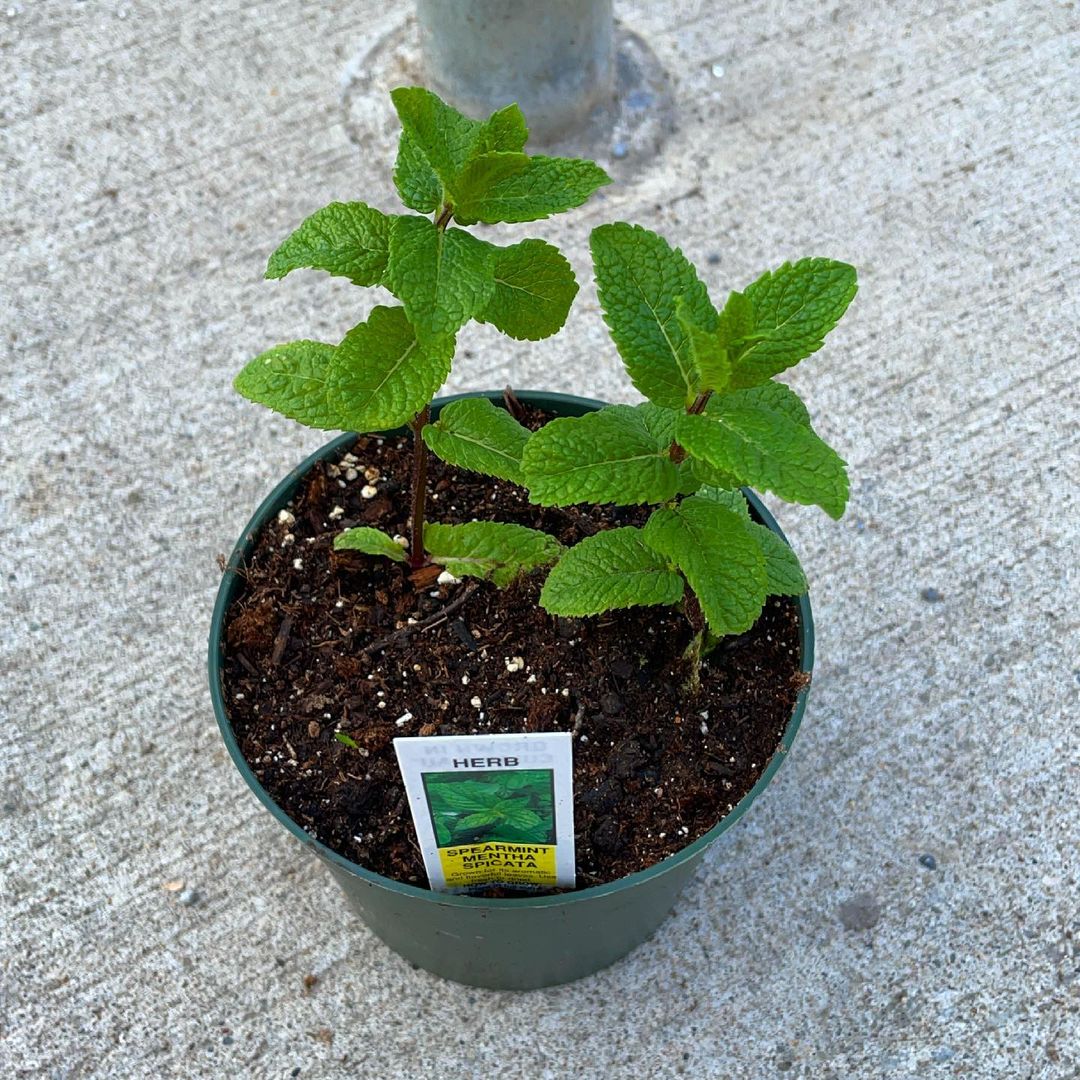
Spearmint plant.
Image credit: @gmf.coxwell via Instagram
A common garnish to freshen up drinks, desserts, and even to cut through the richness of certain savoury dishes, mint may be perceived as a rather high-level herb to grow at home. The truth is, both spearmint and peppermint thrive in Singapore’s warm and humid climate. To grow your own, all you need to do is cut a healthy mint stem and propagate it in a pot of soil.
A quick breakdown of the differences between spearmint and peppermint:
- Spearmint: Leaves are a lighter green in colour. Contains very little menthol and possesses a sweet, minty flavour suitable for culinary use.
- Peppermint: Leaves are a darker green. Higher menthol content and hence, has a cool and refreshing taste which is ideal for herbal teas.
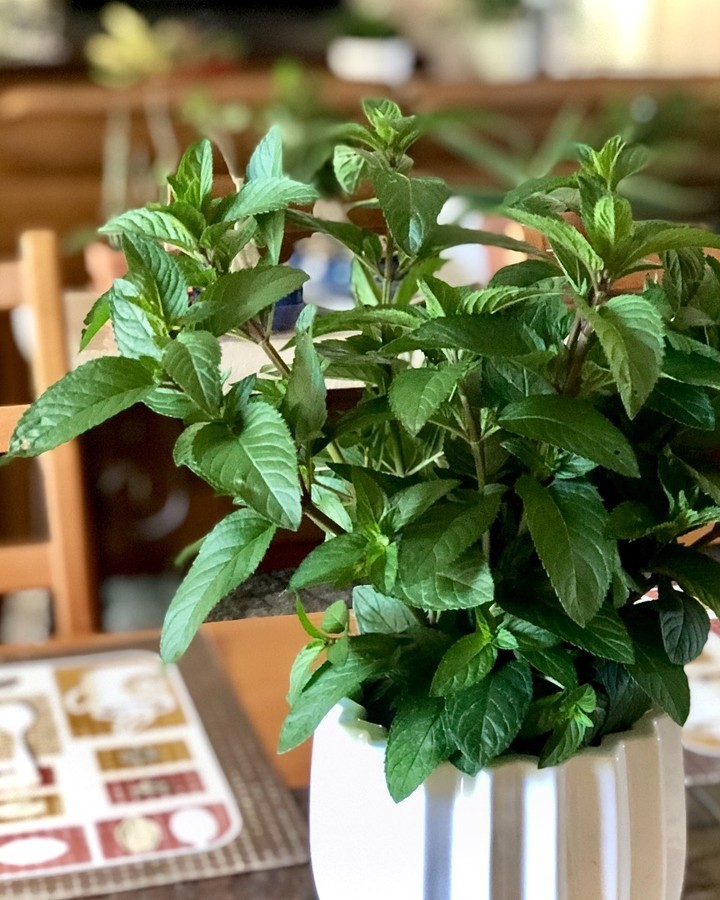
Peppermint plant.
Image credit: @plant.tropics via Instagram
A cup of warm peppermint tea before bedtime is recommended by many sleep experts, as it has calming and relaxation properties. It also acts as a nasal decongestant and helps improve airflow if you’re getting bogged down by a cold, blocked nose, or sinus issues.
9. Basil
Aids heart & liver health, also fights bacterial infections
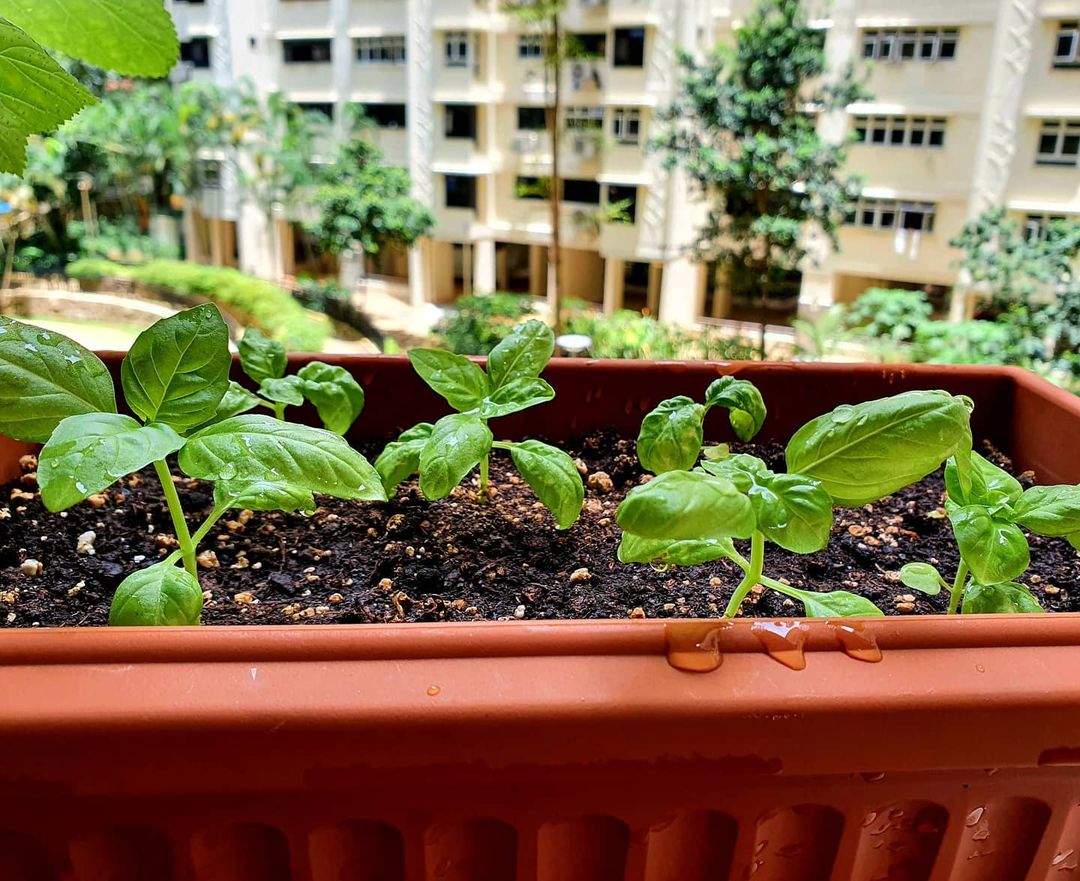
Image credit: @mangofroyox via Instagram
The Singapore climate is unforgiving on many plants which only thrive in winter conditions, but basil remains one of the easiest herbs to grow locally as it is a low maintenance, sun-loving plant.
Besides tasting great in savoury dishes – particularly those from Italian and Thai cuisines – the usage of basil leaves to enhance the sweetness of desserts and drinks has become increasingly popular.
Health wise, basil is high in antioxidants and is said to be able to promote heart health, fight bacterial infections, and regulate liver function – important for alcohol drinkers or those on long-term medication.
Plants to grow in Singapore that have skin & medicinal benefits
Whether your green thumb has been well-cultivated or you’ve just freshly hopped on the home garden bandwagon, it never hurts to introduce some plants with benefits into your sanctuary. After all, you’ll probably save a significant amount of moolah by using your own homegrown remedies the next time you’re suffering from insomnia, skin woes, or even digestion problems.
Some of it may sound a tad too good to be true, but there’s a reason why these plants have been lauded as natural remedies across generations. The medicinal claims are backed by scientific research as well as tried-and-tested reviews from people around the world, so there’s no harm in giving them a try.
Worst comes to worst, you’d have nibbled on a flower or downed some flower water, which can’t really be that bad unless you’ve somehow swallowed a bee too while you’re at it. For even more power-packed plants, check out our guides on carnivorous plants and air-purifying indoor plants as well.
Cover image adapted from: @lifeislush & @veggie_x_blue via Instagram, Planet Dessert
Article originally published on 10th June 2021. Last updated 31st May 2024.
